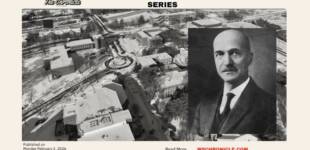Never Again
Holocaust survivor entreats students to remember his story
(pictured above: Hank Brodt speaks at Forsyth Tech.)
An overflow crowd sat in rapt silence for more than an hour Monday as a Triad resident recounted – in harrowing detail – how he survived the Holocaust.
Great interest in Hank Brodt’s story forced Forsyth Technical Community College to move his talk from the Main Campus to a larger venue on West Campus. Middle and high school students from several area schools were among the more than 200 people who crammed into the auditorium; some sat cross-legged on the floor once all the seats were claimed.
There wasn’t a peep from the large crowd after Brodt rose to speak. He was barely a teenager when war came. The Russians were the first to occupy his small Polish town. Though all able-bodied residents were expected to work and audio speakers were set up throughout town to blast pro-Stalin propaganda, Jews like Brodt were not singled out by the Russians for mistreatment like the Jews in the German-occupied portion of Poland. But that all changed; Brodt remembers the day clearly.
“It was Sunday, June 22, 1941 … there was an announcement on Radio Moscow,” he said.
In one of history’s greatest double-crosses, Hitler had invaded Russia after signing a pact with Stalin. By 1942, the Russians had left Poland, leaving it all in German hands.
“They made all of the Jews wear a Star of David,” Brodt said, recalling one of the Germans’ first actions after the takeover.
Soon, Jews began to be corralled and taken to a train station. The able-bodied were placed on different trains from the children and the infirm.
“There were thousands of people lined up. There were trains with cattle cars waiting for us to be loaded,” Brodt said.
The able-bodied were taken to work camps – which differed from concentration camps because inhabitants were allowed to leave during the day – to perform myriad duties in German-occupied towns and cities. In most cases, children and the elderly were sent to concentration camps and then to their deaths in gas chambers. Many of Brodt’s family met that fate; he believes his mother, whom he lost contact with when they were separated at the train station, was among them.
Brodt was sent to one labor camp after another. He served as a messenger at one, picking up lunch and running errands for the Nazis. At Płaszów, the concentration camp featured prominently in the Oscar-winning film “Schindler’s List,” Brodt worked in a salt mine. Later, he was sent to work in a quarry at Mauthausen.
“There were 154 steps … you carried boulders on your shoulders … you went down the steps and you repeated this,” he said. “Some died carrying that boulder.”
The Germans were often crueler than grueling work. At Dachau, the first concentration camp within Germany’s borders, Brodt was tasked with helping to build caves for Germany’s doomed military offensive against the Allies. After the electricity went out in a cave, making it impossible for workers to see, Brodt and others stopped working and sat to wait for the problem to be fixed. They were later punished for their brief period of inactivity with 15 lashes each.
“You feel only the first five,” he said. “Then, the rest of them, your body is dead.”
In early 1945, when it was clear that Hitler would be soundly defeated, Brodt did not return to his camp after a day of work. He encountered a group of American soldiers and agreed to perform odd jobs for them in exchange for food. He stayed connected to the soldiers to well after the war. In late 1940s, one of them assisted Brodt in obtaining clearance to move to the United States. Brodt arrived in New York City on St. Patricks Day and thought the city’s massive parade was all for him.
“They came to welcome us,” he joked. “I was very happy.”
Brodt worked as a welder until he was called upon to serve his new country.
“I get a letter, and Uncle Sam wants me,” he said.
Ironically, he would end up back in Europe – where Allies still had large numbers of peacetime soldiers – to take the place of American GIs sent to fight in the Korean War.
“I was so proud I could do the same thing that the GIs who rescued us did,” Brodt said.
Brodt would marry a woman from the Czech Republic before returning to the United States. They had two daughters and a happy life together before she died a few years short of her 50th birthday. He would remarry and relocate to Guilford County, which he calls home today. An area rabbi first convinced Brodt to share his story. For the most part, he had kept his ordeal bottled up.
“I did not want to talk about it … it hurts,” he said.
In 2006, he accompanied a group of locals on a trip to Europe to visit former concentration camps. The trip included stops in Poland, where Brodt had not set foot since the country’s liberation in the mid-1940s.
“I’m not talking about this for myself; I am speaking on behalf of the people who were killed and can’t tell the story,” he said.
Guy Blynn brought Brodt to Forsyth Tech, where Blynn founded The Blynn Holocaust Collection, a repository of materials intended to help raise awareness of the Holocaust and its consequences.
Blynn told the young attendees that they will be charged with preventing atrocities like the Holocaust in the future and with never letting the memory of such horrors fade.
“We will not be here forever,” Blynn said. “You will be here far longer. You will remember; you must remember.”











